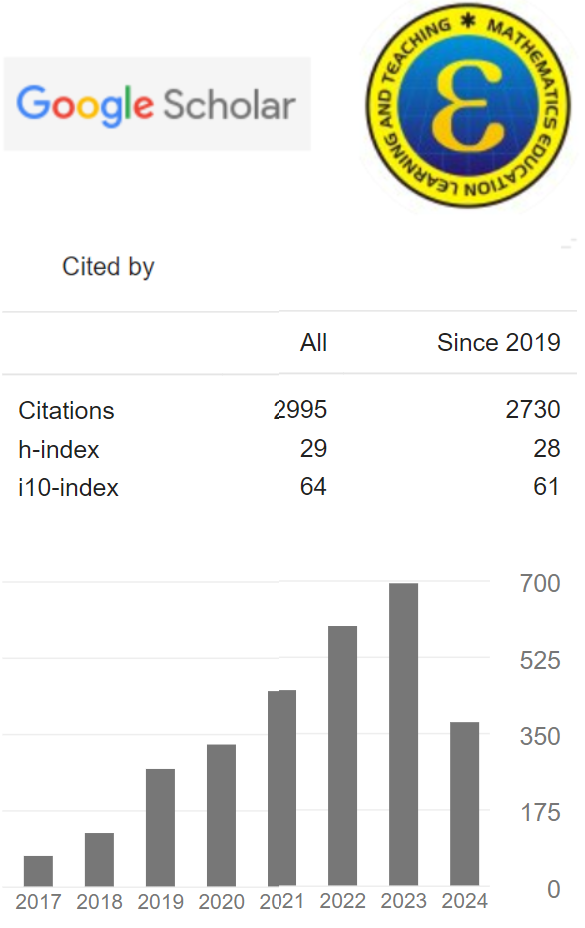Multimodal Interactive Flipbook Arias Model-Based for Critical Thinking Skills
(1) Universitas Muhammadiyah Sorong
(2) Universitas Muhammadiyah Sorong
(3) Universitas Muhammadiyah Sorong
(*) Corresponding Author
Abstract
Keywords
Full Text:
PDFReferences
Agustina, D. W., & Fitrihidajati, H. (2020). Pengembangan Flipbook Berbasis Problem Based Learning (PBL) pada Submateri Pencemaran Lingkungan untuk Melatihkan Keterampilan Berpikir Kritis Peserta Didik Kelas X SMA. Berkala Ilmiah Pendidikan Biologi (BioEdu), 9(2), 325–339. https://doi.org/10.26740/bioedu.v9n2.p325-339
Anak Agung Meka Maharcika, Ni Ketut Suarni, & I Made Gunamantha. (2021). Pengembangan Modul Elektronik (E-Modul) Berbasis Flipbook Maker Untuk Subtema Pekerjaan Di Sekitarku Kelas Iv Sd/Mi. PENDASI: Jurnal Pendidikan Dasar Indonesia, 5(2), 165–174. https://doi.org/10.23887/jurnal_pendas.v5i2.240
Arta, I. G. (2022). Jalak Bali Dengan Pengembangan Addie Model. 04(01), 1–10.
Aziza, Y. (2019). Pengembangan Multiaid Pembelajaran dalam Bentuk Buku Digital Interaktif Berbasis Flipbook Bagi Mahasiswa Teknik Mesin. Jupiter (Jurnal Pendidikan Teknik Elektro), 4(2), 1–10.
Fahmi, Y. W., Djatiprambudi, D., & Handayaningrum, W. (2021). Social Aid Interdisciplinarity in Multimodality of Arts and Culture Education for Millenials. JURNAL PAJAR (Pendidikan Dan Pengajaran), 5(1), 145–158. https://doi.org/10.33578/pjr.v5i1.8257
Hardiyanti, W. E., & Alwi, N. M. (2022). Analisis Kemampuan Literasi Digital Guru PAUD pada Masa Pandemik COVID-19. Jurnal Obsesi : Jurnal Pendidikan Anak Usia Dini, 6(4), 3759–3770. https://doi.org/10.31004/obsesi.v6i4.1657
Kurniawati, E., Hartanto, H., & Zamzaili, Z. (2017). Pengaruh Model Pembelajaran Assurance, Relevance, Interest, Assesment, Satisfaction (Arias) Integratif dan Kemampuan Awal dalam Meningkatkan Pemahaman Konsep dan Pemecahan Masalah Matematika Siswa Sekolah Menengah Pertama di Kepahiang. JUrnal Pendidikan Matematika Raflesia, 2(2), 174–187.
Meinawati, K. L. (2020). Pemanfaatan Youtube Dalam Meningkatkan Kompetensi Tutor Bimbel Edu Private. Comm-Edu (Community Education Journal), 3(1), 19. https://doi.org/10.22460/comm-edu.v3i1.3697
Muhali, M. (2019). Pembelajaran Inovatif Abad Ke-21. Jurnal Penelitian Dan Pengkajian Ilmu Pendidikan: E-Saintika, 3(2), 25. https://doi.org/10.36312/e-saintika.v3i2.126
Noviyanita, W. (2019). Pengembangan Bahan Ajar Elektronik Berbasis Flipbook Maker Pada Materi Program Linear Kelas X Smk. Delta: Jurnal Ilmiah Pendidikan Matematika, 6(2), 41. https://doi.org/10.31941/delta.v6i2.915
Nuraida, D. (2019). Peran Guru Dalam Mengembangkan Keterampilan Berpikir Kritis Siswa Dalam Proses Pembelajaran. Teladan, 4(1), 51–59.
Puspita, E. I., Rustini, T., & Dewi, D. A. (2021). Rancang Bangun Aid E-Book Flipbook Interaktif Pada Materi Interaksi Manusia Dengan Lingkungannya Sekolah Dasar. Journal of Educational Learning and Innovation (ELIa), 1(2), 65–84. https://doi.org/10.46229/elia.v1i2.307
Ravelli, L. J., & Van Leeuwen, T. (2018). Modality in the digital age. Visual Communication, 17(3), 277–297. https://doi.org/10.1177/1470357218764436
Rihani, A. L., Maksum, A., & Nurhasanah, N. (2022). Studi Literatur : Aid Interaktif Ispring Suite Terhadap Hasil Belajar Peserta Didik Kelas V Sekolah Dasar. JKPD) Jurnal Kajian Pendidikan Dasar, 7, 123–131.
Setyo, A. A., Pomalato, S., Hulukati, E., Machmud, T., & Lestari, B. A. (2022). Pembelajaran Digital Interaktif Berbasis Netboard.Me Dan Bookcreator. AKSIOMA: Jurnal Program Studi Pendidikan Matematika, 11(1), 530. https://doi.org/10.24127/ajpm.v11i1.4610
Setyo, A. A., Pomalato, S. W., Hulukati, E. P., Machmud, T., & Djafri, N. (2023). Effectiveness of TPACK-Based Multimodal Digital Teaching Materials for Mathematical Critical Thinking Ability. International Journal of Information and Education Technology, 13(10), 1604–1608. https://doi.org/10.18178/ijiet.2023.13.10.1968
Setyo, A. A., Pomalato, S. W., Hulukati, E. V. I. P., & Djafri, N. (n.d.). Needs Analysis for the Development of Tpack-Based Multimodal Digital Teaching Materials. 1774–1781. https://doi.org/10.17605/OSF.IO/H8QJB
Durmuş, S. (2011). An Investigation Related to the Modelling Levels and Values of Elementary School Prospective Mathematics Teachers, 11(2), 1065–1071.
Graycar, A. (1997). Paedophilia: Policy and Prevention. Retrieved May 17, 2014, Retrieved from http://www.aic.gov.au/documents/A/D/2/{AD2B7912-AA15-4DB3-84B5-5AE6680D0C15}RPP12.pdf
Kumar Singh, Y. (2006). Fundamental of Research Methodology and Statistics. New Delhi: New Age International (P) Ltd.
Panorkou, N., & Pratt, D. (2016). Using Google SketchUp to Develop Students’ Experiences of Dimension in Geometry. Digital Experiences in Mathematics Education, 2(3), 199–227. https://doi.org/10.1007/s40751-016-0021-9
DOI: 10.24235/eduma.v13i1.18105
Article Metrics
Abstract view : 153 timesPDF - 9 times
Refbacks
- There are currently no refbacks.
Copyright (c) 2024 EduMa: Mathematics education learning and teachingâ€â€â€Ž


.png)










